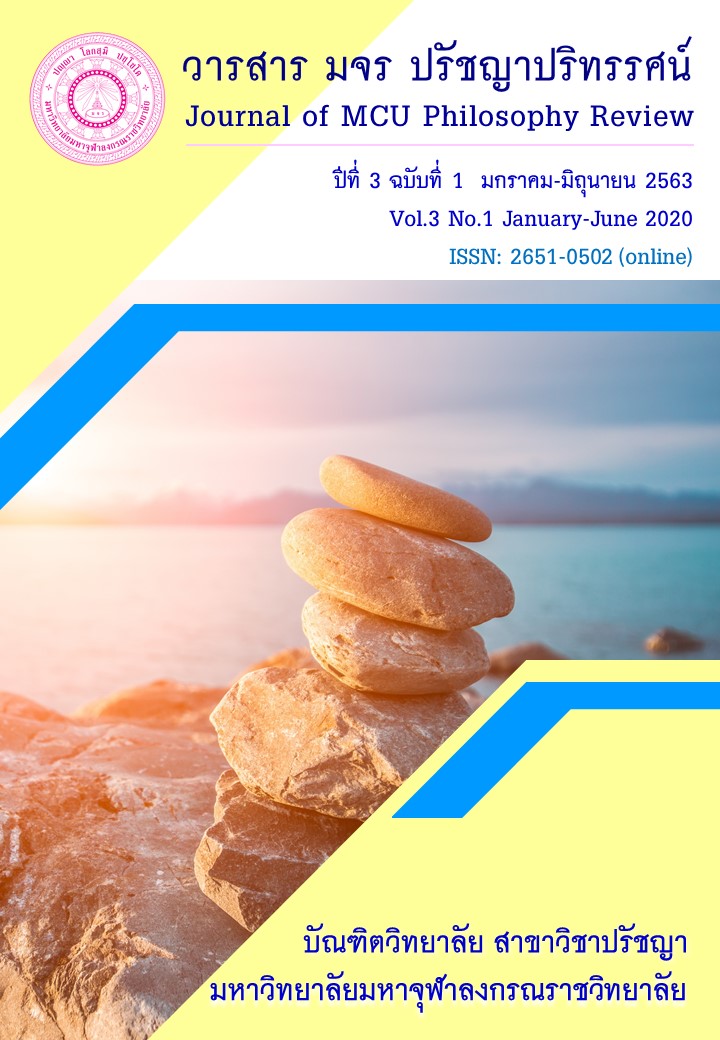A concept of being ownership of oneself in Theravada Buddhist philosophical viewpoint
Main Article Content
Abstract
In this article, an attempt was purposely made to a concept of being ownership of oneself and the problem of right to ethical problem. This is a documentary study. In it, the result was found that according to Theravada Buddhism, in the ultimate sense there is no any ownership, because what is called ‘self’ ‘mine’ ‘I’ no longer exists. It is held by Theravada Buddhism that I is the ownership of myself, because the life in the present birth of mine is continually derived from the past life of mine. It is believed that all of us have intention or freedom in choosing to make any decision of good or bad action and thereby being heir of certain result of such good or bad action. In this respect, the problem of right comes up. According to Theravada Buddhism, rights can be divided into two categories: 1) the primary natural right; it means the right to body and life, and 2) the secondary natural right; it means the right to property. Out of these, the second one can be transferred while the first cannot. In the ethical problem concerning with suicide, it does not violate the first precept, because it is akin to the utilization of the right one possesses, but the assisted suicide called mercy killing becomes immoral because it does violate the right to life and life of one whose life is taken. In purchasing human organs, it is held by Theravada Buddhism as a kind of violation of a seller’s body, because such life cannot be transferred at any cost; human organs are strictly prohibited from selling despite a seller’s consent.
Article Details
บทความที่ได้รับการตีพิมพ์เป็นลิขสิทธิ์ของวารสาร มจร ปรัชญาปริทรรศน์
ข้อความในบทความที่ได้รับการตีพิมพ์ในวารสาร ถือเป็นความรับผิดชอบของผู้เขียนบทความ และข้อคิดเห็นนั้นไม่ถือว่าเป็นทัศนะและความรับผิดชอบของกองบรรณาธิการวารสาร มจร ปรัชญาปริทรรศน์
References
มหาจุฬาลงกรณราชวิทยาลัย. (2539). พระไตรปิฎกฉบับภาษาไทย ฉบับมหาจุฬาลงกรณราชวิทยาลัย. กรุงเทพมหานคร : โรงพิมพ์มหาจุฬาลงกรณราชวิทยาลัย.
มหาจุฬาลงกรณราชวิทยาลัย. (2560). คัมภีร์มิลินทปัญหาภาษาไทย. พิมพ์ครั้งที่ 2. กรุงเทพมหานคร : โรงพิมพ์มหาจุฬาลงกรณราชวิทยาลัย.
มหาจุฬาลงกรณราชวิทยาลัย. (2560). อรรถกถาภาษาไทย 55 เล่ม. กรุงเทพมหานคร : โรงพิมพ์มหาจุฬาลงกรณราชวิทยาลัย.
พระพุทธโฆสาจารย์. (2554). วิสุทธิมรรค ภาค 1 ตอน 1. แปลโดย มหามกุฎราชวิทยาลัย. พิมพ์ครั้งที่ 11. กรุงเทพมหานคร: มหามกุฎราชวิทยาลัย.
สมภาร พรมทา. (2548). พุทธปรัชญา มนุษย์ สังคม และปัญหาจริยธรรม. พิมพ์ครั้งที่ 2. กรุงเทพมหานคร : สำนักพิมพ์ศยาม.
สุมนมาลย์ สิงหะ. (2562). เทคโนโลยีการแพทย์: เครือข่ายวงแหวนของการค้าอวัยวะ. (ออนไลน์) แหล่งที่มา: https://prachatai.com/journal/2015/09/61246. (20 พ.ค. 2562).
Michael J. Sandel. (2554). ความยุติธรรม. แปลโดย สฤณี อาชวานันทกุล แปลจากเรื่อง JUSTICE: WHAT’S THE RIGHT THING TO DO? กรุงเทพมหานคร : โอเพ่นเวิลด์ส.


